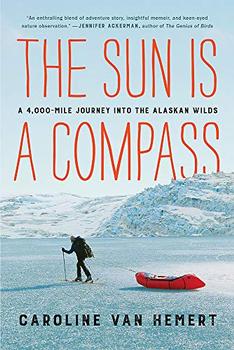Summary | Excerpt | Reviews | Beyond the Book | Readalikes | Genres & Themes | Author Bio

A 4,000-Mile Journey into the Alaskan Wilds
by Caroline Van HemertPrologue
SWIMMING THE CHANDALAR
I'm standing on the bank of the swift Chandalar River in the Brooks Range of northern Alaska, trying to gather the courage to swim across. My husband, Pat, is by my side. We're alone, as we have been for most of the past five months.
The sky is a depthless sort of overcast, no definition in the clouds, no glimmer of sunshine. The temperature hovers just above freezing and the air is damp after a night of rain. I grip the straps of my pack, my fingers raw from the chill, and lean against Pat as we look down at the river that flows in a wide channel sixty feet below us. The only sound is the steady rush of moving water. I push away the voice in my head that echoes a single question. What are we doing?
It's the fifth of August, 2012. Over the last 139 days, we have traversed nearly three thousand miles, most recently through places so lightly traveled our topographic maps have little to say about them. Only the highest peaks are labeled, and then solely by elevation. The Brooks Range is the northernmost major mountain range on earth and has retained its integrity in ways that few places have. Many of the creeks and valleys are nameless, their curves and riffles left unexplored. There are no soft edges here, no boardwalks or trails or park rangers. It's wild, empty, and gritty.
We're here because we're attempting to travel entirely under our own power from the Pacific Northwest to a remote corner of the Alaskan Arctic. We're here because we need wilderness like we need water or air. Like we need each other. For me, this trip is also a journey back to trees and birdsong, to lichen and hoof prints. Before leaving, I had lost my way on the path that carried me from biology to natural wonder. I had forgotten what it meant, not only in my mind, but in my heart, to be a scientist.
We have a thousand miles ahead of us, but for now all that matters is this river. On the map it looked harmless, squiggly and blue. As I stare down at it now, it's the color of mud. From our elevated vantage, the water's opaque surface appears smooth, but when Pat throws a spruce bough from the bank, it bobs in the small waves, spins once, then vanishes quickly downriver.
In the first months of the journey, our destination was so distant that it seemed almost peripheral. Kotzebue. A small village on the shores of the Chukchi Sea. A place on the map as arbitrary as any other. We were consumed by each day, distracted by aching muscles and whales and the simple act of moving. Always moving. But the stakes quietly grew, shapeshifting from a tally of miles into something much more. Only now am I beginning to see this trip for what it is. A celebration and a letting go of youth. A reawakening of the biologist in me. A reckoning between us and the land. Something we must see through to the end.
And so crossing this river has become necessary, in the way that it's necessary to kiss a lover before leaving, to pause and look up when the moon is rising. Our bodies know what is essential and what is not.
* * *
Before we left, people asked us why we were taking this trip; they wondered what compelled us to want to "disappear" for a while. I tried to explain that escapism wasn't our goal—neither of us was running from a broken marriage or drug addiction or academic failure. We weren't trying to set a record or achieve a first. We were simply trying to find our way home.
Shortly after Pat and I met in 2001, we discovered that we were most fully ourselves in wild places. That our love was strongest among rocks and rivers, trees and tundra. Since our first summer together, when we spent two months camped on the bank of a remote Arctic river, we had dreamed about another grand adventure. Increasingly, though, time in the outdoors was taking a backseat to more mundane endeavors. Our trips were shrinking, our commitments growing. Even worse, I had just finished a Ph.D. in biology feeling more distant than ever from the natural world. Five years of study had started as an act of love and turned into pure drudgery.
Excerpted from The Sun Is a Compass by Caroline Van Hemert . Copyright © 2019 by Caroline Van Hemert . Excerpted by permission of Little Brown & Company. All rights reserved. No part of this excerpt may be reproduced or reprinted without permission in writing from the publisher.
A few books well chosen, and well made use of, will be more profitable than a great confused Alexandrian library.
Click Here to find out who said this, as well as discovering other famous literary quotes!
Your guide toexceptional books
BookBrowse seeks out and recommends the best in contemporary fiction and nonfiction—books that not only engage and entertain but also deepen our understanding of ourselves and the world around us.